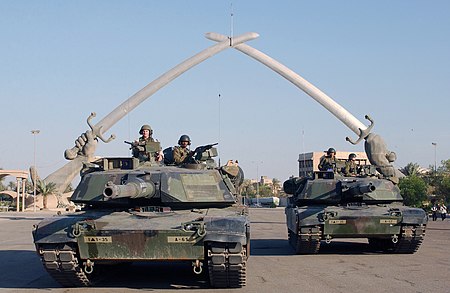The Iraqi National Congress is an Iraqi political party that was led by Ahmed Chalabi who died in 2015. It was formed as an umbrella opposition group with the aid and direction of the United States' government following the Persian Gulf War, for the purpose of fomenting the overthrow of Iraqi President Saddam Hussein.

Iraq actively researched and later employed weapons of mass destruction (WMD) from 1962 to 1991, when it destroyed its chemical weapons stockpile and halted its biological and nuclear weapon programs as required by the United Nations Security Council. The fifth President of Iraq, Saddam Hussein, was internationally condemned for his use of chemical weapons during the 1980s campaign against Iranian and Kurdish civilians during and after the Iran–Iraq War. In the 1980s, Saddam pursued an extensive biological weapons program and a nuclear weapons program, though no nuclear bomb was built. After the Persian Gulf War (1990–1991), the United Nations located and destroyed large quantities of Iraqi chemical weapons and related equipment and materials; Iraq ceased its chemical, biological and nuclear programs.

Paul Dundes Wolfowitz is an American political scientist and diplomat who served as the 10th President of the World Bank, U.S. Deputy Secretary of Defense, U.S. Ambassador to Indonesia, and former dean of Johns Hopkins SAIS. He is currently a visiting scholar at the American Enterprise Institute.

The 2003 invasion of Iraq was the first stage of the Iraq War. The invasion phase began on 19 March 2003 (air) and 20 March 2003 (ground) and lasted just over one month, including 26 days of major combat operations, in which a combined force of troops from the United States, the United Kingdom, Australia and Poland invaded Iraq. This early stage of the war formally ended on 1 May 2003 when U.S. President George W. Bush declared the "end of major combat operations" in his now infamous Mission Accomplished speech, after which the Coalition Provisional Authority (CPA) was established as the first of several successive transitional governments leading up to the first Iraqi parliamentary election in January 2005. U.S. military forces later remained in Iraq until the withdrawal in 2011.

The 1998 bombing of Iraq was a major four-day bombing campaign on Iraqi targets from 16 to 19 December 1998, by the United States and the United Kingdom. The contemporaneous justification for the strikes was Iraq's failure to comply with United Nations Security Council resolutions and its interference with United Nations Special Commission inspectors who were looking for weapons of mass destruction.

Ahmed Abdel Hadi Chalabi was an Iraqi politician, a founder of the Iraqi National Congress (INC) and the President of the Governing Council of Iraq.
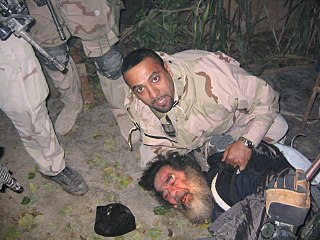
The Capture of Saddam Hussein was an American military operation conducted on 13 December 2003 in the town of ad-Dawr, Iraq, near Tikrit, that led to the capture of Iraqi president Saddam Hussein. The operation was named after the 1984 film Red Dawn. The mission was executed by joint operations Task Force 121—an elite and covert joint special operations team, supported by the 1st Brigade Combat Team of the 4th Infantry Division, commanded by Major General Raymond Odierno.
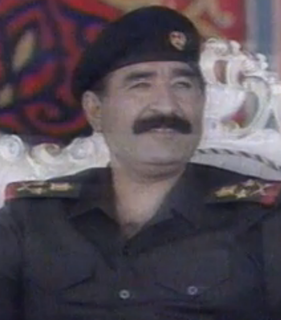
Colonel General Hussein Kamel Hassan al-Majid was the son-in-law and second cousin of Iraqi leader Saddam Hussein. He defected to Jordan and assisted United Nations Special Commission (UNSCOM) and International Atomic Energy Agency (IAEA) inspection teams assigned to look for weapons of mass destruction in Iraq. He was killed the following year for betraying Saddam.

After the 2003 invasion of Iraq, evidence began to emerge of failed attempts by the Iraqi government to bring the conflict to a peaceful resolution.
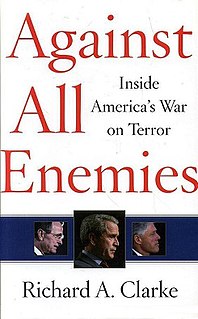
Against All Enemies: Inside America's War on Terror (ISBN 0-7432-6823-7) is a 2004 award-winning book by former U.S. chief counter-terrorism advisor Richard A. Clarke, criticizing past and present presidential administrations for the way they handled the War on Terrorism. The book focused much of its criticism on President George W. Bush, charging that he failed to take sufficient action to protect the country in the elevated-threat period before the September 11 attacks and for the 2003 invasion of Iraq, which Clarke feels greatly hampered the War on Terrorism. The book's title comes from the oath of office taken by all U.S. federal officials, in which they promise to defend the Constitution "against all enemies, foreign and domestic."
The Iraqi Revolutionary Command Council was established after the military coup in 1968, and was the ultimate decision-making body in Iraq before the American-led invasion in 2003. It exercised both executive and legislative authority in the country, with the Chairman and Vice Chairman chosen by a two-thirds majority of the council. The Chairman was also then declared the President of Iraq and he was then allowed to select a Vice President. After Saddam Hussein became President of Iraq in 1979 the council was led by deputy chairman Izzat Ibrahim ad-Douri, deputy Prime Minister Tariq Aziz, and Taha Yassin Ramadan, who had known Saddam since the 1960s. The legislature was composed of the RCC, the National Assembly and a 50-member Kurdish Legislative Council which governed the country. During his presidency, Saddam was Chairman of the RCC and President of the Republic. Other members of the RCC included Salah Omar Al-Ali who held the position between 1968 and 1970, one of Saddam's half-brothers, Barzan Ibrahim al-Tikriti, Taha Yasin Ramadan, Adnan Khairallah, Sa'adoun Shaker Mahmoud, Tariq Aziz Isa, Hasan Ali Nassar al-Namiri, Naim Hamid Haddad and Taha Mohieddin Maruf. It was officially dissolved in 2003 by Paul Bremer per Order Number 2 of the Coalition Provisional Authority.
The following lists events in the year 2003 in Iraq.
Events in the year 2002 in Iraq.
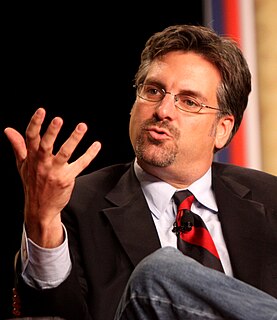
Stephen Forester Hayes is an American journalist and author. In October 2019 Hayes co-founded the online opinion and news publication The Dispatch. Previously, he was a senior writer for National Journal and Editor-in-chief of The Weekly Standard. He was a staunch proponent of the Iraq War and an influential figure in promoting the false claim that the Saddam Hussein regime and Al Qaeda had an operational relationship.

The 5th Marine Regiment is an infantry regiment of the United States Marine Corps based at Marine Corps Base Camp Pendleton, California. It is the most highly decorated regiment in the Marine Corps and falls under the command of the 1st Marine Division and the I Marine Expeditionary Force.

2nd Light Armored Reconnaissance Battalion is a fast and mobilized armored terrestrial reconnaissance battalion of the United States Marine Corps. Their primary weapon system is the 8-wheeled LAV-25 and they fall under the command of the 2nd Marine Division and II Marine Expeditionary Force. The unit is based out of the Marine Corps Base Camp Lejeune, North Carolina. The current mission statement of the battalion is: To perform combined arms reconnaissance and security missions in support of the Ground Combat Element (GCE) of a Marine Air-Ground Task Force (MAGTF). Its mission is to conduct reconnaissance, security and economy of force operations, and, within its capabilities, limited offensive or defensive operations that exploit the unit's mobility and firepower.

The rationale for the Iraq War, both the 2003 invasion of Iraq and the subsequent hostilities, was controversial because the George W. Bush administration began actively pressing for military intervention in Iraq in late 2001. The primary rationalization for the Iraq War was articulated by a joint resolution of the United States Congress known as the Iraq Resolution.
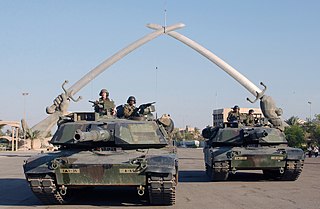
A dispute exists over the legitimacy of the 2003 invasion of Iraq. The debate centers around the question whether the invasion was an unprovoked assault on an independent country that may have breached international law, or if the United Nations Security Council authorized the invasion. Those arguing for its legitimacy often point to Congressional Joint Resolution 114 and UN Security Council resolutions, such as Resolution 1441 and Resolution 678. Those arguing against its legitimacy also cite some of the same sources, stating they do not actually permit war but instead lay out conditions that must be met before war can be declared. Furthermore, the Security Council may only authorise the use of force against an "aggressor" in the interests of preserving peace, whereas the 2003 invasion of Iraq was not provoked by any aggressive military action.

The lead-up to the Iraq War began with United Nations Security Council Resolution 687 and subsequent UN weapons inspectors inside Iraq. This period also saw low-level hostilities between Iraq and the United States-led coalition from 1991–2003.
